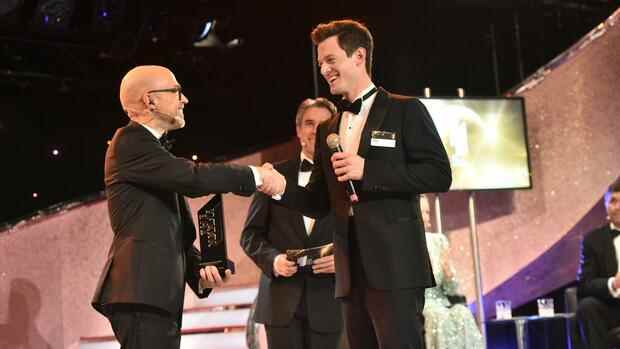Berlin It was another disaster summer. Huge forests burned down in California, and large areas in Siberia and the Mediterranean region were also in flames for weeks. It should not stay that way: Since climate change favors drought and heat, such destruction will probably occur even more frequently in the future.
A start-up from Munich wants to make the fight against fire easier: Orora Tech has developed an early warning system that analyzes data from weather satellites with the help of artificial intelligence – this is an “inexpensive and, above all, scalable method” for preventing and monitoring forest fires.
With this idea, Orora Tech won the German digital prize The Spark on Thursday, presented by Handelsblatt and McKinsey. “In view of the analog prevention methods that are widespread nowadays”, the jury praised the “disruptive novelty of the fully automated solution”.
The start-up Dabbel with software for intelligent building automation landed in second place, while Circunomics came in third with a network for trading in used car batteries. Katharina Jünger, founder of the online medical practice Teleclinic, received the Female Founder Award.
Top jobs of the day
Find the best jobs now and
be notified by email.
With The Spark, Handelsblatt and McKinsey award start-ups from German-speaking countries whose business models have the potential to fundamentally change industries. This year the motto of the competition was “Net Zero Tech” – it was about technologies for an emission-free and sustainable future.
This affects numerous industries, as can be seen from the ideas of the ten finalists who attended the award ceremony in the Tipi at the Chancellery in Berlin on Thursday – and ranges from software for the digitization of construction projects, which should later facilitate the recycling of materials, up to a platform with which companies can determine their CO2 emissions.
Use the possibilities of space
Orora Tech – short for Orbital Oracle Technologies – is a spin-off from the Technical University of Munich. This is no coincidence: A new generation of companies is growing up in the Bavarian metropolis that want to use the economic opportunities of space, including the rocket manufacturer Isar Aerospace.
Handelsblatt and McKinsey honor start-ups whose business models have the potential to fundamentally change industries.
(Photo: Uta Wagner)
In the summer, Orora Tech received 5.8 million euros in an initial institutional financing round with several venture capitalists. With this money, the management around CEO Thomas Grübler wants to shoot small satellites into space that continuously monitor the earth. Because the data available so far, primarily from weather satellites, are incomplete.
Orora Tech has identified different customer groups. A number of commercial forest companies, for example in Australia and Chile, are already using the system. The information should also be relevant for insurance companies. The company estimates that the market volume is in the single-digit billion euro range.
The second-placed company, Dabbel, has developed a program for intelligent building management technology: It controls temperature, ventilation and lighting in commercial buildings. The algorithm takes into account variables such as thermal insulation, humidity and solar radiation. This happens autonomously and thus increases efficiency where a lot of energy has previously been lost due to incorrect control.
The solution of the founders Abel Amaniego, Javier Ferre and Pablo Stahl aims to reduce electricity consumption by up to 40 percent – and thus costs and CO2 emissions. The Spark jury praised the high scalability.
In third place is Circunomics with a new marketplace for used batteries from electric vehicles. Most of them can still serve as energy storage before they end up at the recycling yard, but this has hardly been done so far.
The founders Patrick Peter, Sebastiaan Wolzak and Cesar Prados want to enable the trade in used batteries. In order to create transparency about the state of the energy storage, your start-up collects data on the life cycle and creates a digital twin from it. The jury emphasized that the marketplace would significantly reduce the ecological footprint of electromobility.
This year Katharina Jünger received the Female Founder Award, which is specifically aimed at female founders. The lawyer founded the online medical practice Teleclinic. Adelsschlag was the takeover of the start-up by the Swiss Doc Morris mother Zur Rose in summer 2020.
“Hardly anyone has shaken up the medtech scene in Germany as much as Katharina Jünger,” praised the jury. The 30-year-old has done pioneering work in telemedicine, which not only pays off in the corona pandemic. In addition, Jünger works as an angel investor and in the Chancellor’s Digital Council to promote female founders.
More: Know-how, heads, capital: Germany has everything it needs for a green economic miracle
